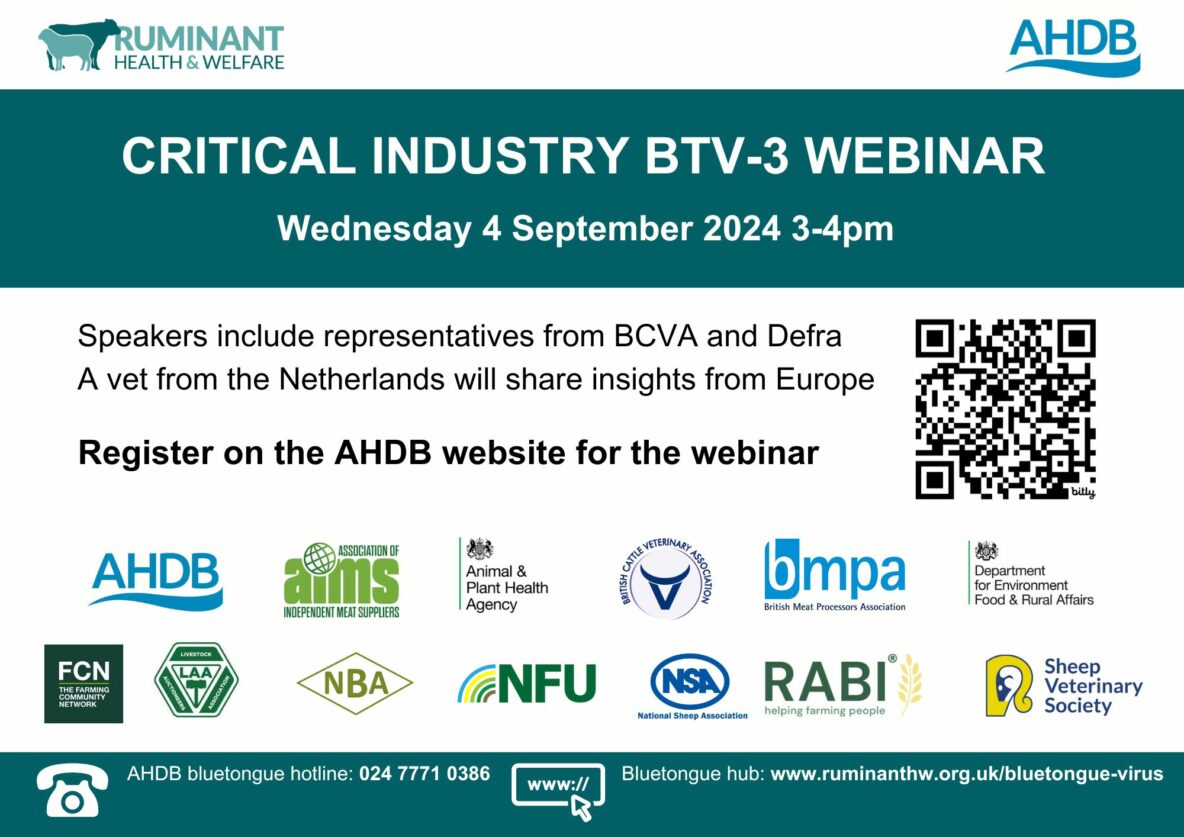Further to the Bluetongue (BTV-3) cases in Norfolk and Suffolk here’s what you need to know:
What is Bluetongue?
Bluetongue is a viral disease of ruminants transmitted by biting midges. There are a number of (sero) types of bluetongue virus (BTV) that are recognised, the most common ones in Europe being BTV-3, 4, and 8 and they can have a devastating impact on livestock. Unlike types 4 and 8, there is no authorised vaccine for BTV-3 in the UK. There is now evidence of some local transmission of BTV-3 now circulating in Norfolk and Suffolk. Bluetongue does not represent a risk to human health. It is, however, a notifiable animal disease. Further information, including clinical signs, can be found at Bluetongue virus | AHDB.
Alternatively, click on the button below to register for our Bluetongue Webinar.
What you can and can’t do?
The original Temporary Control Zones in Norfolk and Suffolk have been replaced by a larger Restricted Zone covering Norfolk, Suffolk and Essex. Farms with land within this zone or straddling the boundary are classified as being within the Restricted Zone. Movement of animals in this zone is likely to cause further spread of the virus. Please think – is the move really necessary? If not, PLEASE do not move your animals. Movement of animals from within the restricted zone is tightly controlled. Latest information on where you can move animals can be found on the Defra website. Alternatively phone the AHDB Bluetongue virus hotline on 0247 771 0386 Monday to Friday 9am to 5pm where someone can direct you to the relevant information.
Be Prepared
Farmers must be able to produce movement records for the farm. Maintaining up to date animal movement records is a legal requirement for all farmers. Should your farm require an investigation you will be required to provide details of all recent animal movements. Whilst this may change as evidence emerges, you can expect to be asked to supply information back to at least 28 July 2024. Defra is urging farmers to be prepared and get these details collated. The quicker you are able to provide these in a readily understandable format, the quicker any investigation can be concluded which is in the interest of our national herd and flock.
Be Vigilant
You should remain vigilant and, as a legal requirement, report any suspicious signs of the disease in livestock to Defra promptly. This can be done by calling the Defra Rural Services Helpline on 03000 200 301. In Wales, contact 0300 303 8268. In Scotland, contact your local Field Service Office. For details of clinical signs and how to report Bluetongue visit GOV.UK Bluetongue: how to spot and report the disease.
Animal welfare
Please consult your private vet should your animals require treatment. Bluetongue disease can cause severe suffering and treatment with non-steroidals and other medication might be necessary.
Minimise spread of the virus
Midges are attracted to animal slurry so it is important to keep all vehicles clean and to reduce animal movements as much as possible.
Join the AHDB Bluetongue webinar
AHDB will be running a Bluetongue update webinar on Wednesday September 4 from 3pm to 4pm with the latest update on the situation. Register for the Bluetongue Virus webinar on the AHDB website and keep an eye on the Bluetongue section of the AHDB website for the latest information.
Support
This will be a difficult time for many farmers. Further support is available on the AHDB website.



